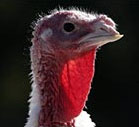In the fourth and final episode of Kill It, Cook It, Eat It, they reviewed and summarized the previous 3 episodes, visited a small poultry 'processing' plant, and showed how a pig is butchered in the traditional way - no stun guns - in Spain.
(Warning: potentially disturbing details follow)
Filed under:
books and media tv ethics education chicken meat
Last night I finally watched the third episode of Kill It, Cook It, Eat It, as it aired instead of recording it for later viewing, fast-forward button at the ready. (My reviews of Part 1 and Part 2.) In this episode, it was the turn of pigs to be slaughtered. (Warning: some gory details follow...warning put here since a reader complained about a previous entry. When animals get slaughtered, it is gory.)
Filed under:
books and media tv ethics education pork meat
I've just watched the second episode of Kill It, Cook It, Eat It. If anything it was more intense than the first. I just couldn't watch it live, just in case I needed to fast-forward some spots, so I recorded it on my DVR and watched it a bit later. As it happens I didn't fast forward anything, though I was very tempted to at times. I made myself sit still and watch.
Filed under:
books and media tv ethics education meat
Last night the first episode of a TV series called Kill It, Cook It, Eat It aired on BBC Three. The premise of the program(me) is to show exactly how meat gets to our plates.
The first episode jumped right in, by showing, in an actual working abattoir, the slaughter and butchering of real live cows. This was witnessed by several members of the public through glass windows in a special observation area built around the abatoir. Later on, the same people ate meat cut from the cows they had just witnessed being slaughtered and prepared on the spot by a chef.
Filed under:
books and media tv ethics education meat
Unless you live in the UK, you probably don't know who Gillian McKeith is. I didn't know much about her even though I do watch British television, since she has a show on Channel 4, which I don't get here. Apparently she is famous as the host of a diet show called "You Are What You Eat", bestselling author of diet books, and hawker of herbal pills. She puts a Doctor in front of her name, and she's regarded as a Health Authority. Yet, she is not a medical doctor or even a properly trained and certified nutritionist. Her only health related degree may or may not come via a correspondence course from a non-accredited American college.
Filed under:
books and media ethics health

The BBC News web site's Magazine section has an article today about the history of how turkey became fast food. While it's about turkey production in the UK, it's probably applicable to any nation that has large scale consumption, and production, of turkey meat.
Filed under:
ingredients ethics turkey
Anyone who has any interest in food, nutrition, where our food comes from, and most importantly, how to eat at all, should read the massive (12 pages) article by Michael Pollan in the New York Times, Unhappy Meals.
Filed under:
lighter ethics philosophy health
Today, October 16th, is World Food Day, a day designated by the Food and Agriculture Organization of the United Nations since 1945 as a day for promoting awareness of issues related to hunger, agriculture and food production.
While much of the time this site, like most food blogs, talk about indulging personal hunger and food cravings, there's a lot to think about on this subject these days, much of it rather sobering.
Filed under:
essays ethics philosophy
Yesterday's musings on the priciness of at least some organic produce reminded me of a very useful guide to pesticides on popular fruits and vegetables, published by the Environmental Working Group. I've listed it before in my Daily Links, but I'm repeating it here in case you missed it. It's a wallet-sized guide to the produce that has the most pesticides (so worth buying organic) down to the ones that have the least (so perhaps worth buying conventional.
Filed under:
vegetables ethics sandwich
I am old enough to recall the '80s rather clearly (and, isn't it a bit scary how '80s fashion like humongous oversized sweaters seem to be making a comeback now? What's next, the return of footballer-sized Dynasty shoulder pads?), so I remember when the first Farm Aid concert took place. At that time, family farms in the U.S. were in dire straights, so a bunch of musical artists, inspired by the massive Live Aid concert, got together to raise money and awareness for the plight of the American farmer.
Filed under:
essays ethics
Pages